Sponsorship Highlights: SSE Sponsorship Highlight: Rosemary Grant Awards
From 2010 to 2017, SSE offered one research award for early career students – the Rosemary Grant Award [1]. SSE has since implemented a new awards program, the Graduate Research Excellence Grants [2], which include the Rosemary Grant Advanced Award for PhD candidates and the R. C. Lewontin Early Award for students in the first two years of their PhD. Continue reading to hear from past recipients of the original Rosemary Grant Award on how the award helped their graduate research work.
“I cannot express how grateful I am to have received a SSE Rosemary Grant Award. As an early career scientist, it can be challenging to pursue research interests beyond the scope of your lab and establish an independent research program. The Rosemary Grant Award made it possible for me to do both. My dissertation work addresses the effects of plant polyploidy on the legume-rhizobia mutualism. With funding from SSE, I was able to bring new study systems into the lab and develop skills necessary for my research. More importantly, this award gave me the freedom to think broadly about unexplored questions in evolutionary biology and develop a research program centered on the questions I found to be most intriguing. Overall, the Rosemary Grant Award not only provided essential support for my research, but also the opportunity to develop a sense of ownership over my graduate experience.” - Nikki Forrester, 2015 Rosemary Grant Award recipient
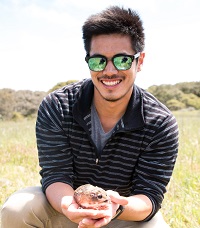 “The Rosemary Grant Award allowed me to test whether niche divergence is stronger than sexual selection in driving the evolution of sexual dimorphism in cranial size and bite force across extant Musteloidea (badgers, otters, raccoons, and weasels). We found that multi-peak OU models favored different dietary regimes over social behavior and that the greatest degree of cranial size and bite force dimorphism were found in terrestrial carnivores. Because competition for terrestrial vertebrate prey is greater than other dietary groups, increased cranial size and bite force dimorphism reduces dietary competition between the sexes. In contrast, neither dietary regime nor social system influenced the evolution of sexual dimorphism in cranial shape. Furthermore, we found that the evolution of sexual dimorphism in bite force is influenced by the evolution of sexual dimorphism in cranial size rather than cranial shape. Overall, our results highlight niche divergence as an important mechanism that maintains the evolution of sexual dimorphism in musteloids. These results were recently accepted for publication in Evolution.” - Chris Law, 2015 Rosemary Grant Award recipient
“The Rosemary Grant Award allowed me to test whether niche divergence is stronger than sexual selection in driving the evolution of sexual dimorphism in cranial size and bite force across extant Musteloidea (badgers, otters, raccoons, and weasels). We found that multi-peak OU models favored different dietary regimes over social behavior and that the greatest degree of cranial size and bite force dimorphism were found in terrestrial carnivores. Because competition for terrestrial vertebrate prey is greater than other dietary groups, increased cranial size and bite force dimorphism reduces dietary competition between the sexes. In contrast, neither dietary regime nor social system influenced the evolution of sexual dimorphism in cranial shape. Furthermore, we found that the evolution of sexual dimorphism in bite force is influenced by the evolution of sexual dimorphism in cranial size rather than cranial shape. Overall, our results highlight niche divergence as an important mechanism that maintains the evolution of sexual dimorphism in musteloids. These results were recently accepted for publication in Evolution.” - Chris Law, 2015 Rosemary Grant Award recipient
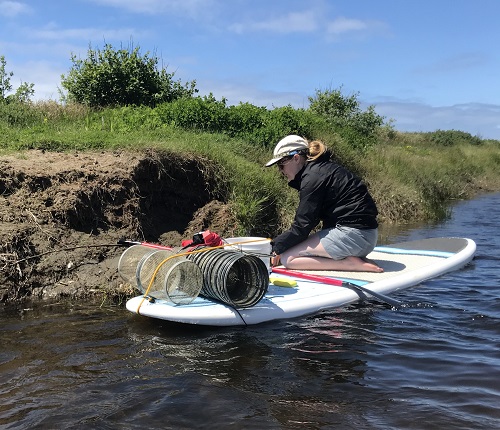 “Parents interact with offspring in myriad ways, and through those interactions change offspring gene expression and traits. Such parental effects can facilitate rapid, long-lasting responses to novel and changing environments. Until now, however, emphasis has been on how parental effects enhance offspring survival. We instead compared the separate and combined impacts of maternal and paternal effects on offspring reproduction, finding dramatic impacts on the strength and direction of sexual selection. A SSE Rosemary Grant Award made it possible to collect threespine stickleback adults from Washington and mate unexposed and/or predator-exposed mothers and fathers in the laboratory. We tested the mating behavior of daughters and found predator-induced maternal and paternal effects relaxed or reversed typical preferences for bright, showy males. Surprisingly, the combined impact of maternal and paternal effects was not cumulative even though their independent effects were similar. We show that maternal, paternal, and joint parental experience change the sexual selection landscape.” - Whitley R. Lehto, 2015 Rosemary Grant Award recipient
“Parents interact with offspring in myriad ways, and through those interactions change offspring gene expression and traits. Such parental effects can facilitate rapid, long-lasting responses to novel and changing environments. Until now, however, emphasis has been on how parental effects enhance offspring survival. We instead compared the separate and combined impacts of maternal and paternal effects on offspring reproduction, finding dramatic impacts on the strength and direction of sexual selection. A SSE Rosemary Grant Award made it possible to collect threespine stickleback adults from Washington and mate unexposed and/or predator-exposed mothers and fathers in the laboratory. We tested the mating behavior of daughters and found predator-induced maternal and paternal effects relaxed or reversed typical preferences for bright, showy males. Surprisingly, the combined impact of maternal and paternal effects was not cumulative even though their independent effects were similar. We show that maternal, paternal, and joint parental experience change the sexual selection landscape.” - Whitley R. Lehto, 2015 Rosemary Grant Award recipient
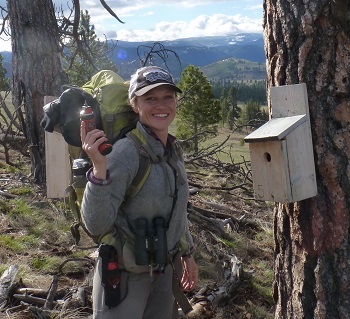 “The world is undergoing massive environmental changes that rapidly shift ecological context, with repercussions for organismal evolution. My research focuses on how complex behaviors evolve. What is the relationship between ecological shifts and behavioral change? How are opportunities for behavioral novelty delineated by underlying physiological pathways? The Rosemary Grant Research Grant has allowed me to pursue these questions, using personality variation in western bluebirds to understand how the environment influences behavioral development and fitness. Bluebirds are invading novel man-made habitat, which shifts a variety of critical social and ecological factors relative to the historic habitat, such as resource availability and population demography. These shifts increase the number of offspring that overlap with their parents in their natal population. As a result, more individuals express a rare alternative behavioral strategy, cooperative breeding. Documenting such shifts in the behavioral compositions of novel populations relative to historic habitat provides insight into evolutionary process, and I am very grateful to the Rosemary Grant Research Grant for providing the funding I needed to complete this fieldwork.” - Ahva Lynn Potticary, 2015 Rosemary Grant Award recipient
“The world is undergoing massive environmental changes that rapidly shift ecological context, with repercussions for organismal evolution. My research focuses on how complex behaviors evolve. What is the relationship between ecological shifts and behavioral change? How are opportunities for behavioral novelty delineated by underlying physiological pathways? The Rosemary Grant Research Grant has allowed me to pursue these questions, using personality variation in western bluebirds to understand how the environment influences behavioral development and fitness. Bluebirds are invading novel man-made habitat, which shifts a variety of critical social and ecological factors relative to the historic habitat, such as resource availability and population demography. These shifts increase the number of offspring that overlap with their parents in their natal population. As a result, more individuals express a rare alternative behavioral strategy, cooperative breeding. Documenting such shifts in the behavioral compositions of novel populations relative to historic habitat provides insight into evolutionary process, and I am very grateful to the Rosemary Grant Research Grant for providing the funding I needed to complete this fieldwork.” - Ahva Lynn Potticary, 2015 Rosemary Grant Award recipient
“I was fortunate to receive a Rosemary Grant Award from the SSE in 2016 while I was doing research for my dissertation on butterfly mate choice and speciation. The award allowed me to maintain captive butterfly populations at the Smithsonian Tropical Research Institute in Panama. This was crucial to my data collection as it allowed me to work year-round with butterflies in a semi-natural setting. Just as importantly, it allowed me to stay in STRI's vibrant research community in Gamboa, Panama where I could collaborate with an excellent community of tropical biologists. I am extremely grateful for the award from SSE for making this opportunity possible.” - Laura Southcott, 2015 Rosemary Grant Award recipient
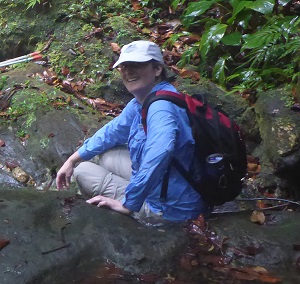 “My first of two research trips to Trinidad was funded by the Rosemary Grant Award which I received in 2015. Because of this award, I was able to test the hypothesis that the extraordinary genetically-based variation in coloration that persists within natural guppy populations is maintained by female behavioral preference for color patterns that are rare or novel. Over the two field seasons, I collected data from eleven natural populations, four which were paired up- and downstream sites within drainages, which differ in predation regime and other ecological factors. I found that females, among all populations and river drainages, preferred males with color patterns that were both unfamiliar and rare, compared to those that were familiar, common, or both. I’m currently preparing a manuscript describing these results for publication. These results support the hypothesis that intersexual selection is responsible for maintaining polymorphism in this system.” - Jennifer Valvo, 2015 Rosemary Grant Award recipient
“My first of two research trips to Trinidad was funded by the Rosemary Grant Award which I received in 2015. Because of this award, I was able to test the hypothesis that the extraordinary genetically-based variation in coloration that persists within natural guppy populations is maintained by female behavioral preference for color patterns that are rare or novel. Over the two field seasons, I collected data from eleven natural populations, four which were paired up- and downstream sites within drainages, which differ in predation regime and other ecological factors. I found that females, among all populations and river drainages, preferred males with color patterns that were both unfamiliar and rare, compared to those that were familiar, common, or both. I’m currently preparing a manuscript describing these results for publication. These results support the hypothesis that intersexual selection is responsible for maintaining polymorphism in this system.” - Jennifer Valvo, 2015 Rosemary Grant Award recipient
 “How species form is a central question in biology, yet 150 years after Darwin speciation remains the mystery of mysteries. The goal of my research at the University of California, Merced, is to understand the evolutionary causes and consequences of color polymorphism and its role in the speciation process. To do this, I use integrative methods to weave together evolutionary history, animal behavior and coloration, and geography into a single garment of understanding of how genetic variation within a species is generated, maintained, and lost through time. The Rosemary Grant award allowed me to develop my ideas locally with my advisor at UC Merced and launch my own international study system with color polymorphic Podarcis erhardii, an endemic lizard species in the Greek islands. I’m in the midst of my second field season and have mentored four UC Merced undergraduates through my field and lab work. Thanks very much to SSE for the support!” - Kinsey Brock, 2016 Rosemary Grant Award recipient
“How species form is a central question in biology, yet 150 years after Darwin speciation remains the mystery of mysteries. The goal of my research at the University of California, Merced, is to understand the evolutionary causes and consequences of color polymorphism and its role in the speciation process. To do this, I use integrative methods to weave together evolutionary history, animal behavior and coloration, and geography into a single garment of understanding of how genetic variation within a species is generated, maintained, and lost through time. The Rosemary Grant award allowed me to develop my ideas locally with my advisor at UC Merced and launch my own international study system with color polymorphic Podarcis erhardii, an endemic lizard species in the Greek islands. I’m in the midst of my second field season and have mentored four UC Merced undergraduates through my field and lab work. Thanks very much to SSE for the support!” - Kinsey Brock, 2016 Rosemary Grant Award recipient
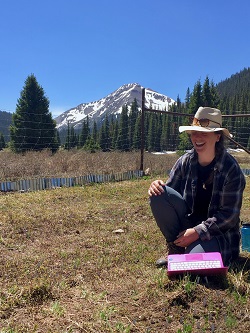 “I am so grateful to the Society for supporting my research with the Rosemary Grant Award! Receiving support early in my graduate studies enabled me to generate important pilot data for my dissertation research and establish my own lines of inquiry separate from what my advisor works on. In addition to helping me through the early stages of my dissertation, some of the award funds also helped me to pay for a field assistant to help with data collection on my major thesis projects later in graduate school. Managing thousands of experimental plants in the field is no small task, and I couldn’t have done it without this award! I really appreciate the Society’s continuing efforts to support graduate students and early career scientists in today’s uncertain funding climate. ” - Lauren Carley, 2016 Rosemary Grant Award recipient
“I am so grateful to the Society for supporting my research with the Rosemary Grant Award! Receiving support early in my graduate studies enabled me to generate important pilot data for my dissertation research and establish my own lines of inquiry separate from what my advisor works on. In addition to helping me through the early stages of my dissertation, some of the award funds also helped me to pay for a field assistant to help with data collection on my major thesis projects later in graduate school. Managing thousands of experimental plants in the field is no small task, and I couldn’t have done it without this award! I really appreciate the Society’s continuing efforts to support graduate students and early career scientists in today’s uncertain funding climate. ” - Lauren Carley, 2016 Rosemary Grant Award recipient
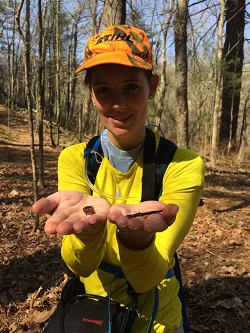 “In 2016, I was fortunate enough to be awarded a Rosemary Grant from SSE, which supported my PhD research into how incubation temperature affects the plasticity of embryonic development and color expression in the eastern red-backed salamander, Plethodon cinereus. My Rosemary Grant covered my field costs and housing for the salamanders and their eggs in the lab. Thanks to the financial support of SSE, for the first time I was able to collect gravid female salamanders from multiple populations across two different states (CT and OH). I was able to obtain eggs from these salamanders using hormone injections and successfully raise eggs to hatching in two different temperature treatments. My Rosemary Grant Award allowed me to both validate and improve my incubation methods. I am now in the third round of experiments and this work will culminate at the end of this year in two publications. Thank you to SSE for the financial support and you can follow the progress of my final year of experiments on Twitter: @annette9_evans” - Annette Evans, 2016 Rosemary Grant Award recipient
“In 2016, I was fortunate enough to be awarded a Rosemary Grant from SSE, which supported my PhD research into how incubation temperature affects the plasticity of embryonic development and color expression in the eastern red-backed salamander, Plethodon cinereus. My Rosemary Grant covered my field costs and housing for the salamanders and their eggs in the lab. Thanks to the financial support of SSE, for the first time I was able to collect gravid female salamanders from multiple populations across two different states (CT and OH). I was able to obtain eggs from these salamanders using hormone injections and successfully raise eggs to hatching in two different temperature treatments. My Rosemary Grant Award allowed me to both validate and improve my incubation methods. I am now in the third round of experiments and this work will culminate at the end of this year in two publications. Thank you to SSE for the financial support and you can follow the progress of my final year of experiments on Twitter: @annette9_evans” - Annette Evans, 2016 Rosemary Grant Award recipient
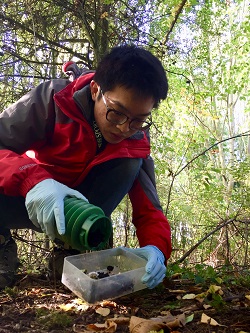 “Burying beetles and their phoretic mites are widely believed to evolve in a commensal relationship, such that mites hitch a ride on beetles as a mean of transporting among small vertebrate carrions, upon which they both breed. Despite mites have been previously found to be beneficial for beetles, robust empirical evidence and the mechanism underlying such interspecific mutualism remain largely unexplored. With a huge support from Rosemary Grant Award, I was capable of carrying out the field experimental manipulation at the University of Cambridge, testing the interacting effects of biotic and abiotic environments on the interaction between beetles and mites. Essentially, I found that increased temperature led to stronger blowfly competition over carcass resources, hence promoting mutualism between beetles and mites. In cooler environments, however, bearing mites reduced beetle’s breeding success, compared to beetles without mites. Therefore, temperature-mediated interspecific competition drives a shift of beetle-mite interaction from parasitism to mutualism.” - Syuan-Jyun Sun, 2016 Rosemary Grant Award recipient
“Burying beetles and their phoretic mites are widely believed to evolve in a commensal relationship, such that mites hitch a ride on beetles as a mean of transporting among small vertebrate carrions, upon which they both breed. Despite mites have been previously found to be beneficial for beetles, robust empirical evidence and the mechanism underlying such interspecific mutualism remain largely unexplored. With a huge support from Rosemary Grant Award, I was capable of carrying out the field experimental manipulation at the University of Cambridge, testing the interacting effects of biotic and abiotic environments on the interaction between beetles and mites. Essentially, I found that increased temperature led to stronger blowfly competition over carcass resources, hence promoting mutualism between beetles and mites. In cooler environments, however, bearing mites reduced beetle’s breeding success, compared to beetles without mites. Therefore, temperature-mediated interspecific competition drives a shift of beetle-mite interaction from parasitism to mutualism.” - Syuan-Jyun Sun, 2016 Rosemary Grant Award recipient
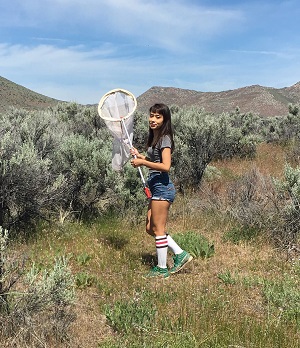 “In 2016, I was fortunate enough to receive a Rosemary Grant Award from the Society for the Study of Evolution. This grant funded the second chapter of my dissertation, which focuses on the ecological immunology of the Melissa blue butterfly, Lycaeides melissa. For my dissertation work, I am looking at whether the colonization of a novel resource (in this case the host plant) by the Melissa blue butterfly has an effect on the immune response, performance, or survival of this insect. In addition, I am interested in how host plant related microbes can potentially affect the ability of the Melissa blue butterfly to utilize novel host plants. I used Rosemary Grant funds to investigate how maternal microbes modulated performance and immune response in Melissa blue larvae. This work has been presented previously at Evolution (2017) and Symbiosis (2017) and is currently being prepped for submission.” - Su'ad Yoon, 2016 Rosemary Grant Award recipient
“In 2016, I was fortunate enough to receive a Rosemary Grant Award from the Society for the Study of Evolution. This grant funded the second chapter of my dissertation, which focuses on the ecological immunology of the Melissa blue butterfly, Lycaeides melissa. For my dissertation work, I am looking at whether the colonization of a novel resource (in this case the host plant) by the Melissa blue butterfly has an effect on the immune response, performance, or survival of this insect. In addition, I am interested in how host plant related microbes can potentially affect the ability of the Melissa blue butterfly to utilize novel host plants. I used Rosemary Grant funds to investigate how maternal microbes modulated performance and immune response in Melissa blue larvae. This work has been presented previously at Evolution (2017) and Symbiosis (2017) and is currently being prepped for submission.” - Su'ad Yoon, 2016 Rosemary Grant Award recipient